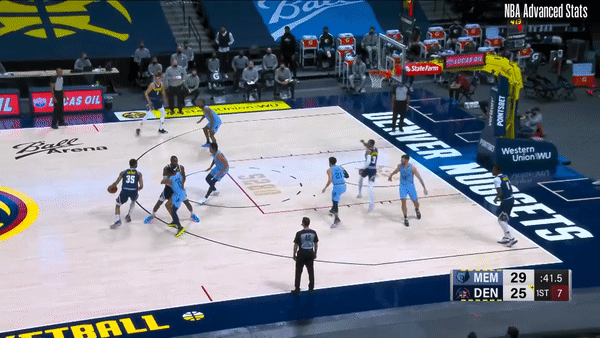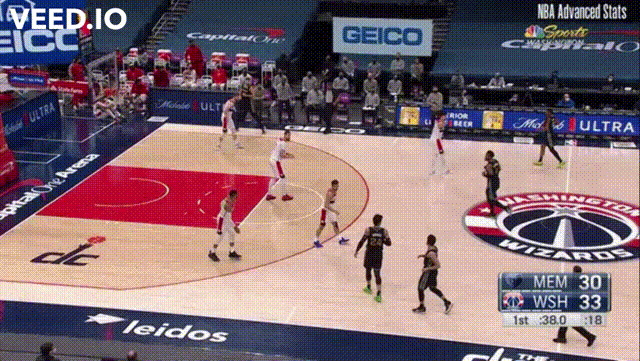The best player you haven't heard of
ifykyk
Usually, the best players in the NBA receive the most attention from fans and media. That’s the system working like it should. But sometimes a good player slips through the cracks, rarely has his name brought up on broadcasts or podcasts, and as a result, gains cult status among his followers. Like discovering the Smith Westerns before Dye It Blonde, recognizing the talents of an unheralded player can feel like being part of an exclusive ifykyk club.
Recently, I reached out to the folks at basketball-reference.com to ask if they’d be willing to share the web traffic numbers for each player on their site since the start of the season. My goal was to try and identify the players whose accomplishments have been most overlooked by the general public this season. Basketball-Reference is one of the most popular destinations on the internet for all things NBA, so it stands to reason that player page views might be a good proxy for the amount of public attention every player receives.
Sean Forman, the site’s president, obliged my odd request.
Armed with the data on each player’s page views since the start of the season, I looked at the relationship between how impactful1 a player is and the traffic on their Basketball-Reference page. In general, better players tend to receive more traffic on their page. That’s the system working like it should.
But there was one player who proved to be a huge exception to the rule no matter how I sliced the data.
De’Anthony Melton might just be the best player you’ve never heard of. He’s an outlier in every which way. His notoriety, or lackthereof, is completely out of sync with how good he actually is.
Among popular all-in-one metrics2, he ranks as high as 14th (in ESPN’s RPM) and no lower than 59th (in Basketball-Index’s LEBRON) among players with at least 500 minutes played.
On Monday night against the Nuggets, Melton poured in 25 points, grabbed eight rebounds, and dished out five assists to go along with four steals. It was his best individual game of the year, but the Grizzlies have been outscoring opponents all season by upwards of 10 points per 100 possessions in the minutes Melton has been on the court. When he’s not filling up the stat sheet, he’s filling in the gaps to help his team win.
It’s not hard to understand why the 22-year-old has eluded mainstream attention. He was a second-round draft pick by the Houston Rockets in 2018 and had already been traded twice in his young career as a sweetener in salary dumps (once for Ryan Anderson and another for Josh Jackson). He comes off the bench in Memphis, one of the smallest media markets in the league. His traditional box score stats don’t leap off the page and his reputation as a defensive-minded guard hardly lends itself to viral social media clips.
To give you an idea of how low-profile Melton is, consider this: the most viewed video when you search his name on YouTube is his summer league highlights from more than two years ago.
The closest Melton came to capturing national attention is when he blocked Anthony Davis and uncorked a dunk on Talen Horton-Tucker all in the same possession.
(Full disclosure: Melton’s dunk on THT is the only Top Shot Moment that I own. I bought it for like $10 a couple of months ago at the peak of NFT mania because it was one of the cheapest ones I could find at the time — also because it whips. As of today, it ain’t worth shit and there aren’t enough people who read this newsletter to change that fact.)
And despite what Chris Vernon thinks, I’d argue he doesn’t get enough love in Memphis either. Google search interest coming from the Memphis area on all the Grizzlies players reveals Melton to be one of the least searched for guys on the team. He also has one of the smallest followings on social media.
The Grizzlies are already too good to have a reasonable shot at drafting another star. And despite its excellent food (Central BBQ fans rise up), Memphis is far from a free agent destination. So the Grizzlies best bet for landing a third guy to pair alongside Ja Morant and Jaren Jackson Jr., is either via player development or trade.
That’s what makes Melton one of the most intriguing young players in the NBA right now. His development over the next few seasons could be the difference in the Grizzlies ascending from a plucky League Pass team to one you wouldn’t want to see in the playoffs. And because Melton is under contract for the next three seasons at a cost that would make Lu Dort’s agent blush, the Grizzlies can easily afford to keep him until they know for sure what they have in him.
Relative to his Daily Plus Minus (DPM) — a projection of how we can expect a player to perform going forward — there’s a credible case to be made that Melton already has one of the league’s most valuable contracts. The chart below shows each player’s current DPM and their 2020-21 salary in millions.
Melton is centered near the cluster of players whose salaries are artificially capped because they’re on rookie deals. Each of the players surrounding Melton — Jayson Tatum, Luka Doncic, Trae Young, and Donovan Mitchell — will all but certainly receive max extensions if they haven’t already. Meanwhile, Melton will be making less than the Mid-Level Exception in each of his next three seasons.
To be fair, Melton isn’t asked to do nearly as much as the other guys he’s clustered around in the chart above. Melton does just a few things really well, while guys like Tatum do nearly everything well. Also, it’s important to emphasize that just because Melton is productive in his role as a back-up, it doesn’t mean he’d have a similar level of success as a starter.
But if there’s a reason to believe that Memphis would benefit from rolling out an M&M starting backcourt in the near future, it’s Melton’s sudden emergence as a legitimate three-point threat.
Last season, Melton shot just 29 percent from beyond the arc. This year, he’s doubled the amount of threes he’s taking per game and is canning 46 percent of them, fifth best in the NBA among qualifying players.
And he’s not just taking wide open threes while standing in the corner. He’s doing it off the dribble and in transition — two qualities that Memphis has been short on all season.
One small thing that endears me to Melton is that he’s never met a two-for-one opportunity that he didn’t like. On Monday night, at the end of the first quarter, he quickly looked at the shot clock after gathering a defensive rebound, raced up the sideline, and drilled a transition three with 31 seconds left.
That left enough time for Memphis to steal another possession before the end of the quarter, which resulted in … another Melton transition three.
It doesn’t always work out this well, but the fact that he’s hunting for these kinds of shots should give Grizzlies fans optimism. These end-of-quarter moments are when Melton ratchets up his aggression and shows flashes of the kind of scorer he could be.
If there’s a reason to temper expectations it’s that Melton’s impressive improvement as a three-point shooter has been a little too impressive. His 18-percentage-point improvement in his three-point shot relative to last year would represent one of the largest year-over-year gains for any player who has taken at least 100 threes in consecutive seasons since 1980.
I’m not taking any bets on him continuing his current level hot shooting, but he’s also only 22. That’s young enough to where improvement is expected. It’s not like he’s some mid-career player who suddenly started shooting fire out his ass.
Since the start of the season, Melton’s Daily Plus Minus (DPM) — once again, a projection of how well a player is expected to perform going forward — has steadily increased, going from a “hey, this guy might good,” to a “holy shit, how good is he?”
I reached out to Kostya Medvedovsky, the creator of DPM, to ask how the change in Melton’s projection since the start of the season compares to other players. Medvedovsky confirmed what I expected: no player has seen a larger increase in their DPM since the start of the season than Melton. Here’s how his progression this season stacks up against some other notable players who have shown improvement.
It should be noted that coming into this season, Melton had played considerably fewer games than either Julius Randle or Jerami Grant. So in some respects it’s easier for him to improve his projections in a single season since he doesn’t have as long a track record that can be held against him.
I don’t want to give off the wrong impression. It’s not like Melton is some world-beater hiding out at the Lamplighter Lounge in Memphis. Chances are he tops out as nothing more than a super-sub. But it’s well within the range of likely outcomes for him to become the Memphis version of Marcus Smart, and if a few things break right, the new-age Derek Fisher. Which is to say, Melton has a good chance of retiring with more championship rings than All-Star appearances.
Elsewhere
Each year since 2017, Max Croes has tried to predict the outcome of the end of season awards by manually tracking what likely voters say throughout the season. By listening to every NBA podcast under the sun and reading every beat reporter’s writing, Croes is able to reveal what the results are likely to be before the votes ever counted. The first year he did it, in 2017, his tracker revealed that Russell Westbrook was going to win the MVP over James Harden, a result that was far from certain at the time.
This year, he’s doing it again. But he needs your help.
Before he can start tracking how voters will vote, he needs to find out who the voters are. The NBA doesn’t reveal the list of voters until the end of the season so there’s some educated guesswork involved. Croes has already identified a good chunk of the likely voters by looking at past ballots and which media members had a vote for the All-Star game, but there are still some missing.
Croes posted what he knows to r/nba this morning and is asking for help in identifying the rest.
We’ll check back in with Croes in a few weeks as the season winds down to see what he’s dug up and whether we can expect any surprises.
To measure a player’s impact I looked at six different all-in-one metrics, including:
Box Plus/Minus 2.0 (BPM) by Daniel Meyers
Daily Plus/Minus (DPM) by Kostya Medvedovsky
Estimated Plus/Minus (EPM) by Taylor Snarr
Luck-adjusted player Estimate using a Box prior Regularized ON-off (LEBRON) by Krishna Narsu and Tim/Cranjis McBasketball
Robust Algorithm (using) Player Tracking (and) On/Off Ratings (RAPTOR) from fivethirtyeight.com
Real Plus/Minus (RPM) from espn.com
Data is current as of April 18th, 2021.













Top notch article, Owen! I just don't get why Melton hasn't played more, hopefully his game on Monday forces Jenkins to do so.
Mr. Do Something!! As a Grizzlies fan especially, I gotta say: great post as always, Owen.